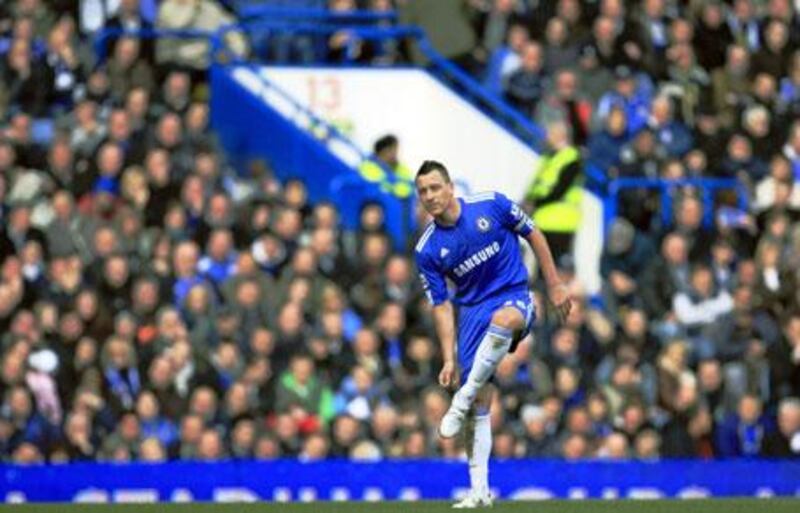In England, it made the front pages as well as the back: Team Terry 2 Team Bridge 4. Indeed, events before kick-off were interpreted as news. Unostentatious as Wayne Bridge's dodging of a handshake with John Terry was, it made headlines. While it has been easy to dismiss Terry's relationship with Bridge's former partner, Vanessa Perroncel, as a scandal, Saturday confirmed the footballing importance of the affair.
And not just to Fabio Capello, either. Bridge is out of the England squad and, barring a rethink, the World Cup. But Manchester City's 4-2 win provided irrefutable proof that Terry's actions have damaged Chelsea. He is not, of course, responsible for the calf injury that has sidelined Petr Cech. His unconvincing deputy, Henrique Hilario, was culpable for the first two City goals. But the equaliser, and perhaps the pivotal goal, could have been cut off at source. After Bridge cleared, John Obi Mikel missed his header. Carlos Tevez then beat a hesitant Terry all too easily; the central defender was then unable to catch up with the striker.
In his first game after Terry's extra-marital antics became public knowledge, he scored the winner at Burnley. It suggested that, as the banner at Stamford Bridge ("JT: captain, leader, legend") does, he is a fearless figure, capable of banishing off-field issues from his mind. His last four appearances lend themselves to a very different conclusion. Terry erred for both Everton goals, scored by Louis Saha, at Goodison Park on February 10.
At Wolves, a wild miskick allowed Kevin Foley a glorious chance to equalise. At the San Siro on Wednesday, he granted Diego Milito too much room to score Inter Milan's opener. His problems may have been personal, but his private life has impacted on his professional life. "I think everyone in football knows what the guy is like off the field," was Craig Bellamy's damning verdict. Even City's most outspoken player admitted: "On the field he's an outstanding player and captain for Chelsea."
Normally that is true. Recently, however, Terry's actions have harmed Chelsea, endangering them in their pursuit of both the Premier League and the Champions League. Deprived of the authority that came both from his status and the surfeit of confidence that manifested itself in arrogance, he cuts a lesser figure. In the eyes of some of the most influential figures, he is damaged: Capello confirmed that Terry will not lead England again during his reign.
If, as seems likely, player power is belatedly curbed at Stamford Bridge, he will have fewer advantages at his club. For some, it is a question of trust. For others, the issue is that, apart from a couple of lines in the Chelsea programme which related to Saha's brace rather than his other misdemeanours, Terry has not apologised. This is not to suggest that the PR exercise that was Tiger Woods's televised statement of penitence is advisable, but defiance appears increasingly misjudged.
Partisan rivalries in the club game mean England captains, past and present, can be booed. Supporters, as well as players, can be a moral vacuum and the section of the Chelsea support who jeered the blameless Bridge certainly are. But fans can also provide an insight into public opinion. Stamford Bridge echoed to the sound of "Terry, what's the score?" when City had taken a commanding lead. It is schadenfreude, but it is also significant. And Bridge, a lesser player who has had an indifferent season, performed with a quiet competence and an understated dignity. The sight of Tevez pointing delightedly at his wronged teammate after scoring City's third underlined the motivation for his fellow squad members. Bridge was not just the victor. He was the moral winner as well.
Attention was understandably focused on one Manchester City defender on Saturday. Another merits a mention, however.
Vincent Kompany was a marginal figure in the first half of this season, but he has shown a solidity since Roberto Mancini selected him in the centre of defence. In contrast, Mark Hughes's expensive axis of Kolo Toure and Joleon Lescott rarely convinced. While the Ivorian is the captain, the pairing of Kompany and Lescott merit an extended run together. "Puzzling," was the description Martin O'Neill used in one interview. "Inexplicable," was his choice in another, and a more correct one.
Referee Phil Dowd's decision not to dismiss, or even book, Nemanja Vidic for the Manchester United defender's fourth-minute challenge on Gabriel Agbonlahor may have decided the destiny of the Carling Cup. Aston Villa's James Milner scored the resulting penalty but Vidic was the last defender and O'Neill is entitled to question if the occasion was too much for the official. Wayne Rooney's winner appeared a natural conclusion, given his superlative form, but his initial station on the bench was instructive, too: for the second successive season, United have won the competition without feeling the need to field a full-strength side in the final.
For genuinely big clubs such as Villa or, for that matter, Everton or Manchester City, who are desperate for any trophy, it must be depressing to see another club adopt such a cavalier approach and emerge victorious. @Email:sports@thenational.ae






